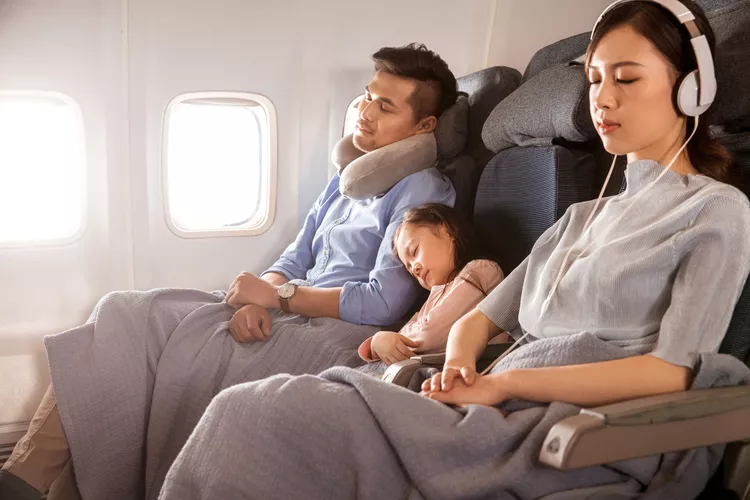Summary of Travel Tips
A long flight in an economy seat doesn’t have to be something to endure. Try and get an aisle seat for easy access to the galley when required (or just to take a quick walk to get your blood flowing) and let these tips help you travel more comfortably.
Avoiding Jet Lag
:max_bytes(150000):strip_icc():format(webp)/GettyImages-159759598-5966043f3df78cdc68c2f85c.jpg)
Jet lag is the disruption of the body’s rhythms with travel across time zones, combined with pre-travel sleep deprivation. To help adjust, set your watch to the destination time as soon as you board. Flights eastward generally cause worse symptoms than those heading west. A simple rule of thumb is that the number of days needed to recover equals two-thirds of the time zones crossed. Conversely, for westbound flights, expect to take about half that number of days.
Wear Shoes
:max_bytes(150000):strip_icc():format(webp)/GettyImages-598298007-596604a43df78cdc68c2f85e.jpg)
It’s essential to wear shoes when using airplane toilets. Although flight attendants strive to maintain cleanliness, it’s best to avoid potential contaminants. Choose loose, comfortable shoes since your feet may swell during the flight; lightweight sandals are a good option.
Request Two Drinks
:max_bytes(150000):strip_icc():format(webp)/GettyImages-170409390-5966051b3df78cdc68c2f867.jpg)
Flight attendants often allow passengers to request two drinks at a time; this way, you won’t have to call them back shortly after. Make sure to drink plenty of water and juice to stay hydrated while avoiding caffeinated beverages like soda, tea, and coffee.
Essential Toiletries
:max_bytes(150000):strip_icc():format(webp)/GettyImages-522002081-596605b53df78cdc68c2f882.jpg)
Despite liquid security restrictions, basic toiletries can be brought on board. It’s wise to check prior to traveling as regulations may change. Consider packing a small toothpaste (under 100 ml), a toothbrush, moisturizer, and deodorant to help freshen up. If time permits, you can always refresh yourself in the airport restroom after landing.
Order Food Early
:max_bytes(150000):strip_icc():format(webp)/GettyImages-128097762-596606983df78cdc68c2f8a4.jpg)
If you prefer to eat early during your flight, consider ordering a special meal ahead of time during your ticket purchase, with at least 24 hours’ notice. However, be aware that this will not expedite the clearing of your tray.
Dress in Layers
:max_bytes(150000):strip_icc():format(webp)/GettyImages-513925583-596607093df78cdc68c2f8d9.jpg)
Dressing in layers is advantageous as you navigate busy airports and manage the varying air conditioning on planes. A body warmer or vest with pockets adds extra storage space, making your trip more convenient.
Do In-Flight Exercises
:max_bytes(150000):strip_icc():format(webp)/GettyImages-168725853-5966091f3df78cdc68c2f8f6.jpg)
Make an effort to stretch your legs regularly, or at least rotate your ankles once every hour. You’ll typically find recommended exercises outlined in the in-flight magazine to help keep you active.
Manage Dry Air
:max_bytes(150000):strip_icc():format(webp)/GettyImages-88997192-596609975f9b583f1817b3e4.jpg)
To combat dry air during your flight, keep the air vent above you open. Dampen a face cloth, place it over your face, and direct the airflow at it; this can help alleviate dryness effectively.
Chewing Gum Benefits
:max_bytes(150000):strip_icc():format(webp)/GettyImages-126551656-59660a1b3df78cdc68c2f979.jpg)
Chewing gum can ease the discomfort caused by changes in air pressure, which may occur not only during take-off and landing but also throughout the flight. Moreover, chewing gum can provide a distraction if you feel nervous.
Use Cushions for Support
:max_bytes(150000):strip_icc():format(webp)/GettyImages-170409065-59660b085f9b583f1817b46d.jpg)
To alleviate lower back pain, use one of the pillows provided by the airline and place it between your lower back (just below your ribs) and the seat. For neck support during rest, consider bringing your own inflatable neck pillow or scrunch one provided by the airline.




